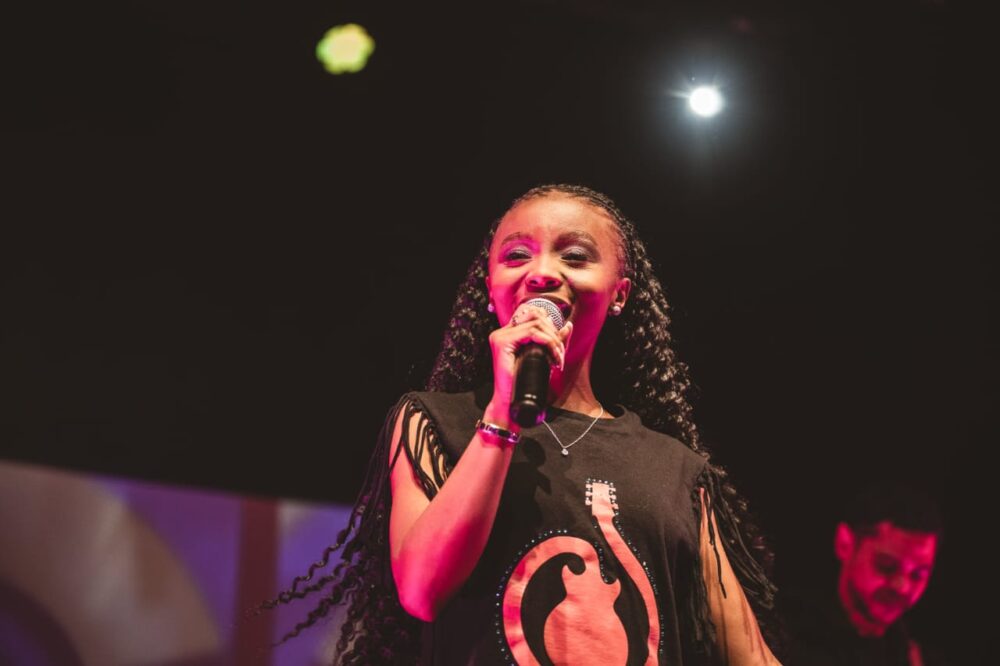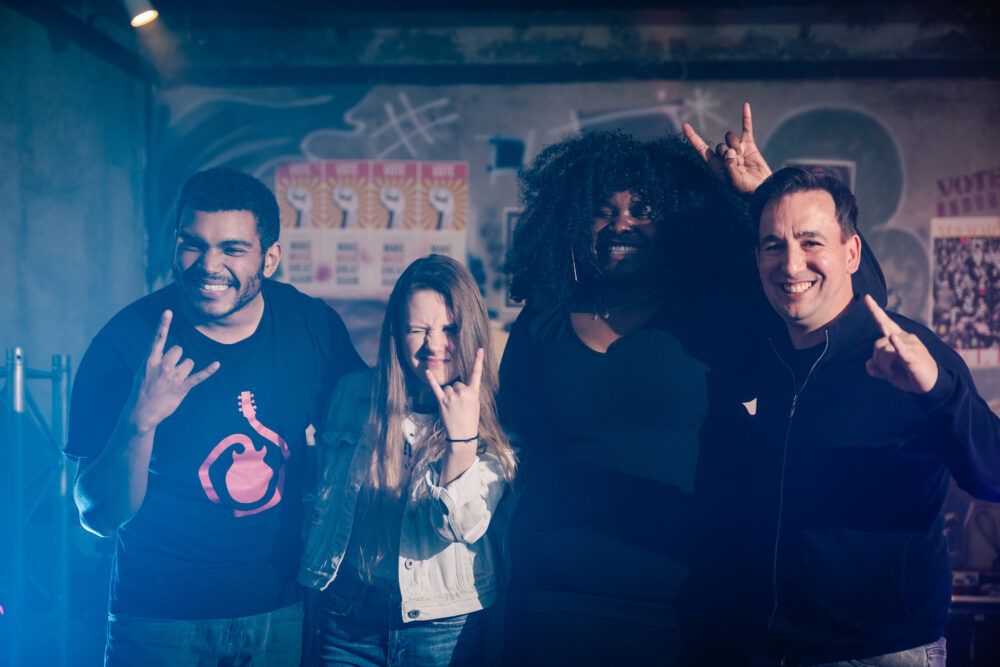In her own words: The Mail & Guardian’s multimedia journalist Busi Lethole explores her vocal range. Photo: Nova4Media
For as long as I can remember, I’ve been in love with music. I’ve carried it and moved with it in every facet of my life. Music has always made its presence known to me.
Hearing certain songs takes me down memory lane to a specific time in my life — birthday parties to funerals, road trips, a Sunday service at church — and even just the time teenage me spent in my celebrity-poster-filled bedroom, eagerly learning the choreography from a favourite artist’s video seen on MTV, back when it was actually about music.
Naturally, my love for music piqued an interest in singing. The first time I was captivated by the concept of “singing” I must have been around the age of five or six. My mom had just purchased the much-anticipated video cassette of South African gospel singer Rebecca Malope’s Live at The State Theatre 1996 concert.
The release marked a historic moment in South Africa’s music industry as Malope, dubbed the Queen of Gospel, was the first black musician invited to perform at the State Theatre, just two years into the new democratic South Africa.
It was sold out and in attendance were various ministers and high-ranking officials of the newly elected government of the ANC.
The concert was co-produced by Hugh Masekela, who also made a special appearance.
Little me would play that video cassette of Malope for hours on end, repeating the lyrics and learning the choreography of the energy-filled dance moves.
The Queen of Gospel isn’t your average singer. She is a performer in every sense and her performance during the concert was exquisite.
But one moment that stood out for me was when she performed the hit ‘Umoya Wam’, where she and fellow gospel artist Vuyo Mokoena (who died in 2008) jumped high into the air repeatedly before dancing around in a circle. The audience erupted.
To this day, I occasionally watch the video on YouTube to get that nostalgic feeling.
Rebecca Malope live at the State Theatre in 1996. ‘Umoya Wam’ dancing performed at the 46:43 mark.
Malope started the show wearing a black dress and, as fate would have it, I had a similar, kid-friendly black dress. You couldn’t tell me I wasn’t Malope. I would wear that dress every single time I watched that video cassette, with a VCR remote in my hand, pretending I was holding a microphone, performing on that very stage.
What little me admired most about the Queen of Gospel was how she completely let her heart out on that stage. She gave everything and then some. That’s what set her apart from the ordinary. That’s why she got the call inviting her to become a part of history.
Little me, who was mesmerised by the performer that Malope was, decided at that moment that she wanted to become a singer even though she didn’t have “performer” in her vocabulary.
It explains why I’ve always gravitated towards performers such as Beyoncé, Boom Shaka and Michael Jackson. It all began with Malope.
After I matriculated, I wanted to pursue the arts — singing and acting — however, my parents suggested I study something that would give me a “more stable career”.
Given the state of South Africa’s entertainment industry, and the many stories of struggling professionals in both acting and music, a part of me thanks them.
I decided to pursue journalism instead and, although I have worked in the industry for nine years, the singing and acting itch just kept coming back.
Having done part-time acting training at The Market Theatre Laboratory, I decided that this would be the year I would focus on music.
While I’ve had two private vocal coaches in the past, I felt I needed more. The School of Rock Parktown North, which opened its doors in November, became that “more”.
What made it especially appealing was the fact that, not only do they offer weekly one-on-one lessons with a voice teacher, they offer once-a-week band rehearsals.
“Wow! Singing with a whole band,” I thought to myself. Now, that’s something I hadn’t done before.
After a trial with the school — which I went into pegging myself as a beginner — they concluded I was at the advanced singing level. It was a no-brainer for me to join and that is the programme I enrolled in.
Although I listen to the likes of Paramore and Coldplay, I certainly wouldn’t call myself a rock fan. It was for this very reason that I felt a little bit intimidated. However, that quickly turned into a realisation that this was an opportunity to step out of my comfort zone. Also, despite its name, the School of Rock Parktown North doesn’t exclusively focus on rock. Students are welcome to explore other genres of music.
Asked what makes the School of Rock different from more traditional music schools in South Africa, general manager Jarred Rosenberg,replies: “Performance.”
“We don’t just teach music, so you can eventually perform on stage, we put you on stage from the start and teach you through real performances,” he continues.
“Our ‘song-first’ approach, combined with our unique methodology and method app, gives students weekly private lessons and group rehearsals. Every three months, students perform in a full rock concert as part of a real band. That experience — working together, having fun and sharing the thrill of a live show — changes everything.”
 Photo: Vocal teacher Phumla Ndlovu
Photo: Vocal teacher Phumla Ndlovu
Vocal teacher Phumla Ndlovu helped impart knowledge about the instrument I have within.
Her first impression: “What a big voice — that can convey confidence and self-assurance, making you sound authoritative. The moment you started singing, I listened.”
She said that the biggest challenge we had to work on was my articulation, as this prevented her from hearing the lyrics.
The techniques Ndlovu helped me with included complex scales to challenge my vocal range and help me control my voice as well as to transition smoothly between registers.
 Banding together: The members of Unresolved (from left) Jericho Hendricks, Ayla Gelbart, Busi Lethole and Victor Germeshuizen. Photo: Nova4Media
Banding together: The members of Unresolved (from left) Jericho Hendricks, Ayla Gelbart, Busi Lethole and Victor Germeshuizen. Photo: Nova4Media
My band Unresolved consists of me (vocals), Ayla Gelbart (drums), Victor Germeshuizen (electric guitar) and Jericho Hendricks (keyboard and bass guitar).
Creating chemistry between students who have never played together before is not as tricky as one would think.
Hendricks, who is the school’s music director, says: “I don’t force it. I always create room for the awkward silences, the missed cues, the weird energy. Then I throw them into the deep end.
“Chemistry doesn’t form when it’s comfortable. It happens when they realise they need each other to make the music work. That’s when they stop playing as individuals and start listening to each other.”
The songs chosen by the school and our band included Sisters Are Doin’ It For Themselves by Eurythmics and Aretha Franklin; Carry On Wayward Son by Kansas and Joker and the Thief by Wolfmother.
On deciding what students are going to perform, Rosenberg says each season’s theme and song selection is “thoughtfully chosen to both challenge and excite our students, while supporting their growth according to our methodology and skill levels”.
I had been battling a cold for about two weeks in the lead-up to the Saturday morning of our grand performance. I was a bit concerned that my voice would not be at the level it needed to be to pull off a performance I would be proud of.
I had been nursing my voice and taking rest. Practising that morning, my voice sounded like itself again.
My brothers and friends would see me on stage with a band for the first time ever.
After arriving at the Democracy Bar in Illovo, I remembered everything I had been taught that season but the one thing that stuck in my head was: “Have fun on stage!”
I also remembered little Busi from the Nineties and activated the performer within me for her.
I remembered how Malope made me feel when she performed and hoped to have the same effect on the people that came out to watch us.
As I got on stage with my band, I said a silent prayer. It was showtime. But I need not have worried — my band and I completely rocked the stage! We set it on fire! It was electric! It was fun! We had enormous fun! For the first time in a long time I felt like I belonged.
I have grown in many ways since signing on at the school. Coach Ndlovu says she has seen a big improvement in my articulation, as well as my range, which has enabled me to sing high-pitched songs.
“You have also mastered how to effectively use your different vocal registers. Your stage presence and your ability to connect with the crowd is exceptional,” she says.
Reflecting on the performance, I realised I had made my inner child proud. I felt like I had made my parents, who are no longer with us, proud. Most importantly, I felt I had made God proud, because I was finally doing something with the talent he blessed me with.
After the performance, multiple people approached me. I was particularly moved by two young children who ran up and gave me the biggest hug, telling me how much they enjoyed our performance.
Again, I was reminded of little me and how she was now making little humans fall in love with music, just like Malope made her feel all those years ago.
And that was probably one of the most fulfilling moments of my life.
Busi Lethole is a multimedia journalist with the Mail & Guardian.